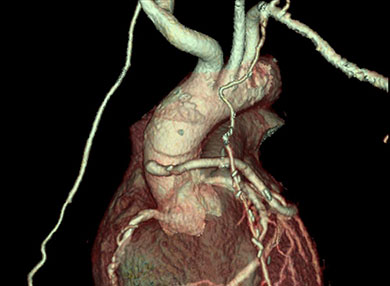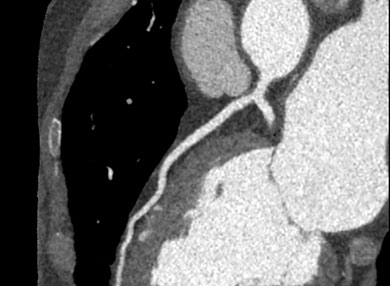Been referred for a CTCA? What you should know
If you have been referred by your doctor for a CT coronary angiogram (CTCA), it pays to be armed with the right information. This will ensure the procedure goes smoothly and will help you understand the results with your doctor.
What is a CT coronary angiogram?
A CT coronary angiogram or CTCA is a dynamic 3D imaging scan or x-ray that records pictures of your heart and your coronary arteries to diagnose the cause of chest pain and other symptoms. This procedure is often done to check for heart abnormalities and see if the coronary arteries are narrowed or blocked.

Preparation
Working closely with your doctor you may need to take medication before you arrive for your scan or on the day of your scan at MMI. This medication will enhance the scan's quality. Our registered nurses will be with you during the medication phase and after the CTCA is complete.
Before the pictures are taken, a dye is injected into a vein in your arm which highlights any coronary artery blockages. This test is used to diagnose the cause of chest pain and other symptoms of coronary artery disease.
You may feel a warm flush or tingling once the contrast is injected.
The cardiac CT scan is reviewed before you leave, and one of our registered nurses will see you before you go.
Your doctor may refer you to get a CT coronary angiogram if you exhibit symptoms of coronary artery disease such as:
- new or increasing chest pain
- abnormal results on a heart stress test
- blood vessel problems or a chest injury
- a heart valve problem that requires surgery
- a congenital heart defect
- arrhythmia or an irregular heartbeat
- breathing problems
- lightheadedness or any dizzy spells
- pain or some discomfort felt in your arms, left shoulder, back, neck, jaw, or stomach
- excessive sweating, nausea or vomiting
- heartburn.
In addition, your doctor may request an angiogram to check your need for treatment such as angioplasty or stent, coronary artery bypass surgery (CABG), or other types of medical therapy.
Aside from coronary artery disease, a CT angiogram is also used to diagnose a range of heart problems such as aneurysm, heart arrhythmias or irregular heartbeats, or some birth defects such as a hole in the heart.

A CT coronary angiogram is done in our research-grade and high-speed diagnostic CT scanner.
An X-ray-sensitive dye or contrast is then injected into a vein in your arm and this contrast eventually reaches the cardiac blood vessels that supply blood to your heart muscle. Our low dose CT scanner performs a high-speed 3D scan of your heart in between heartbeats to avoid movement.
Prior to the procedure, you need to fast for 2 hours prior, this means no food or drink (except for water). You’ll also need to stop all caffeine, cigarettes, viagra and other stimulants 12 hours beforehand. The reason why caffeinated drinks should be avoided 12 hours before the procedure, is because these can increase your heart rate, which can interfere with your doctor getting clear pictures of your heart. You will also need to abstain from physical exercise that morning before you arrive at MMI.
You will also need to remove any clothing from the waist up, such as jewellery, accessories, or eyeglasses, and change into a hospital gown. It is best to leave your valuables at home and wear something that you can easily change out of.
The results of your CT coronary angiogram can show doctors what’s wrong with your blood vessels. It can show how many of your coronary arteries are blocked or narrowed by fatty plaques (atherosclerosis). It can also pinpoint where your blockages are and how much blood is blocked through your blood vessels. In addition, a CTCA can also track how blood flows through your heart and blood vessels.
Once your doctor knows this information, your doctor can then determine the best course of treatment necessary and if the current state of your heart poses any significant danger to your health.
After an angiogram, your doctor is then able to decide if a coronary angioplasty or stenting is necessary to clear your clogged arteries.
Macquarie Medical Imaging is your trusted medical imaging partner, giving you accurate, research-grade medical imaging and interpretation for you and your family’s peace of mind.
MMI is equipped with a CT Machine that scans the heart in between heartbeats and uses very low radiation for these kinds of scans. MMI is your cardiac imaging centre for CTCA scans — the expertise of our staff makes all the difference. If your doctor has ordered a coronary CT angiogram, take the next step to better health and choose MMI. Make an appointment with us today.